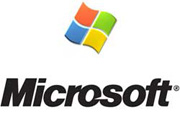
Microsoft has been ordered by a U.S. jury to pay $1.52 billion in a patent dispute over the MP3 digital file format, the technology at the heart of the digital music boom.
If upheld on appeal, it would be the largest patent judgment on record. The ruling, in U.S. District Court in San Diego on Thursday, was a victory for Alcatel-Lucent, the networking equipment company. Its forebears include Bell Laboratories, which was involved in the development of MP3 almost two decades ago. At issue is the way the Windows Media Player software from Microsoft plays audio files using MP3, the most common method of distributing music on the Internet. If the ruling stands, Apple and hundreds of other companies that make products that play MP3 files, including portable players, computers and software, could also face demands to pay royalties to Alcatel. Microsoft and others have licensed MP3 - not from Alcatel- Lucent, but from a consortium led by the Fraunhofer Institute, a large German research organization that was involved in the format's development, along with Bell Labs and the French electronics company Thomson. The current case turns on two patents that Alcatel claims were developed by Bell Labs before it joined with Fraunhofer to develop MP3. "Intellectual property is a core asset of the company," said Joan Campion, a spokeswoman for Alcatel-Lucent. "We will continue to protect and defend that asset." Thomas Burt, the deputy general counsel of Microsoft, said the company would most likely petition the judge in the San Diego case, Rudi Brewster, to set aside or reduce the judgment. If Brewster does not, Microsoft will probably take the case to the U.S. appeals court in Washington, which hears patent cases. Microsoft argued that one patent in question did not apply to its MP3 software and that the other was included in the Fraunhofer software that it paid to license. Further, it argued that the damages sought by Alcatel were unreasonably high, pointing out that it paid Thomson, which represented the consortium in its dealings over the patent, a flat $16 million fee for the rights to the MP3 software. Alcatel argued that the damages should be based on a royalty of 0.5 percent of the total value of Windows computers sold. John Desmarais, a partner with Kirkland & Ellis who represented Alcatel, said the proposed damages were consistent with patent law. He said it was not appropriate to compare them with the $16 million Microsoft paid Thomson because the rights to the Bell Labs patents were far more valuable. "It's like going to the supermarket and paying $1 for a bar of soap," he said. "That lets you use the soap. We were offering the equivalent of the right to make soap any way they wanted." The jury supported Alcatel's arguments on every count except one. It deadlocked on the question of whether Microsoft willfully infringed on the Bell Labs patents. If the jury had found that it did, Microsoft would have had to pay triple damages. "Microsoft has been and to some degree continues to be at a competitive disadvantage, as it did not file for patents for many, many, many years," said Jack Russo, a patent lawyer with Russo & Hale in Palo Alto, California. That makes it harder, he said, to work out deals with other large companies in which they exchange the rights to each other's patents. Large companies like AT&T and IBM "have huge patent portfolios and that represents large and unpredictable risks for companies like Microsoft," he said. The judgment is part of a complex litigation by Alcatel to enforce claims related to Bell Labs patents. The case was initially brought against Dell and Gateway, which make computers using Microsoft software. Other trials are pending for technology related to speech recognition, user interfaces and video processing. Microsoft has countered with a claim, filed with the International Trade Commission, that Alcatel is violating its patents related to messaging technology. The largest award for a patent infringement case to date was the $909 million that Kodak was ordered to pay in 1990 to Polaroid for violating patents related to instant cameras. |





